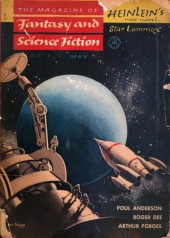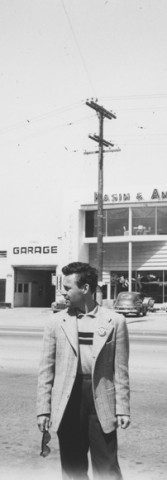 The Gingerbread Man
The Gingerbread Man
by Dale Jennings
As originally printed in
Fantasy and Science Fiction
May 1954
Dale Jennings is a Texan who does not love his native state and an advertising salesman who does love his profession, which he describes as “a glorious flowering of decadence that reminds me of the last days of the Roman Empire.” Perhaps as insurance against the arrival of the Goths, he is now starting a side career as a short story writer, and makes his debut with a straightforward little tale of pure terror which sounds as if, like Edward Lucas White’s classics, it might be the direct transcription of a nightmare.
 Before he stepped down on the rubber pad that would open the door he asked what time it was. The bus driver held his big watch down at an angle to catch the light from the dashboard: “Exactly two minutes to 3. Your wife’s gonna raise the roof.”
Before he stepped down on the rubber pad that would open the door he asked what time it was. The bus driver held his big watch down at an angle to catch the light from the dashboard: “Exactly two minutes to 3. Your wife’s gonna raise the roof.”
“Nope, I’m coming home from work and I’m a real honest-to-gosh bachelor with nine cold blocks to walk to an empty room.”
“Fella, if I was your age with our looks, I’d be glad to walk nine blocks without a family care in the world.”
“Maybe, only maybe. Night.”
He walked away from the bus and past the closed drug store. Beyond, it was very dark. These old streets were so crooked that no two street lights could be seen at the same time. It was an old residential section where big, private mansions had become rooming houses. The tiny night lights behind these cut-glass doors suggested nothing homelike. The gardens were pitch black and the wind made clear little noises with trees and scraps of paper. He stopped and turned away from the wind to light a cigarette. As he ducked his head toward the flame, he saw that he was being followed.
A police dog had just come to a stop back there half a block away. From what he could see, it was a big animal, lean and powerful. As he watched, it stood motionless looking up his way. When he turned to walk on, the started too. The bus pulled out of is wait at the end of the line and took with it the only other sign of life in the night.

The young man walked on, smoked and hummed to himself in time to the beat of his heels on the walk. Then his brows lifted at another sound. It was a quick pat-pat-pat- and the faint whisper of claws on cement. He glanced over his shoulder. The big dog had halved the distance between them and as keeping pace about 50 feet back.
The young man tried an experiment. He stopped suddenly; the dog stopped. He started and the dog started with him. The young man smiled wryly, shrugged and quickened his pace.
During the next two blocks the animal again cut in two the distance between them.
Under the next street light, he stopped, faced the animal and whistled to it. He spoke reassuringly, then squatted with one hand held out. The big dog merely stood looking straight at him, not panting, not moving as it watched. Reflected light made flat, cold discs of its eyes.
The young man rose and, still talking softly, started toward the dog. A deep growl came out of the furry darkness. The man stopped and lowered his hand uncertainly. Those eyes hadn’t left him an instant. the growl grew louder; he started backing up, then turned and went on quickly.
The sound of the claws on the cement became increasingly clear. The dog was only a few yards away now. The young man stated to cross the street at the usual place. The dog was loping in the gutter now, and almost upon him.
He returned to the walk. He smiled too carelessly and urged the dog on: “Come on, boy! You’ll have to run faster than that to catch an old track man. Hurry up or I might get away. ‘Run, run as fast as you can! You can’t catch me! I’m the Gingerbread Man!’”
The dog had moved to the middle of the street. It was alongside him now. He had to cross here to get home. The animal stood directly in his path. he stopped and spoke softly. “What the hell? Are you going to keep me walking the streets all night? Look, boy, I live up that way. I don’t mind you following me, but follow me home, dammit.”
He started to go around the dog. Its body tensed, crouched to spring. Its growl told about dark night, cold hate and death.
Then a car was coming up the street and he was smiling at all his foolishness. He stood in the light and waved. The car slowed down to go around the dog. There were two people inside looking at him through the closed windows. He shouted, “This dog’s—he’s chasing me! I think he’s mad!” They stared, looked at each other and roared away fast. He stood alone on the corner swearing after them.
“I wonder if I could go in one of these rooming houses and use the phone. But would the police give a damn? It sounds crazy. Oh, hell, this is just a dog. I’ll find me a rock. They always run when you pick up something.”
But as he bent for a small rock, the animal began creeping toward him; it growled steadily. He backed away with his hands half-raised. He found himself shouting, “Help!” as loudly as he could. At the word, the dog sprang.
In an instant, normal fear became panic and he was running as fast as he could. The animal trotted behind him.
Now he was running in no particular direction, away from the beast.
Suddenly the animal was at his left elbow. He swerved to the right and ran up an alley. He could see nothing. The whole world was nothing but blackness. The night was a rasp of claws, a great panting beside him and that mounting growl.
The growl rose to the roaring snarl that comes with an animal’s attack. Fangs closed on his arm. He wrenched away moaning, felt the teeth rake his arm and the sleeve peel open. He fell into another alleyway, ran down it, bumped from wall to wall.
Suddenly he was in a great open yard. There was a light, a good warm light in a doorway and a man was standing there. His friendly voice was calling out, “What’s going on out there? Young fellow, are you in trouble?” Moaning with joy, the young man stumbled forward, threw himself at the light, fell on the floor beyond the man. The door closed just as the animal lunged one last time.
The big dog stopped, sniffed at the bottom of the door, then stood with ears perked high as it watched the shadows on the shade. Suddenly the lights snapped out and the house was in total darkness. The big dog turned, trotted around the corner to the big doghouse. Just inside the arched door was a big saucer of milk. He lapped it up noisily and lay on the familiar rug with a big nasal sigh.
The HIC is grateful to Jack Clark for providing this text.

